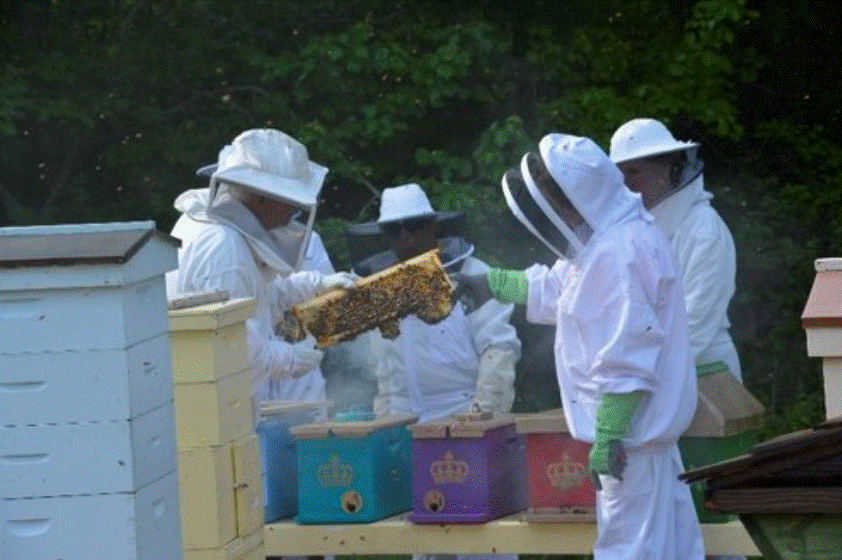
Looking for a slightly off-beat hobby that also greatly improves our environment? Consider the Lewes Beekeepers Club. Eighty-five percent of the plants on earth require bees and other pollinators to exist. According to its web site, “the Lewes Beekeeping Club works to instill an appreciation of honeybees through community outreach programs and by teaching the art and science of beekeeping to its members. Ensuring the health and future of our honeybees is essential to our survival.”
The club launched in 2016 when several members of the University of Delaware’s Osher Lifelong Learning Institute gathered to discuss how valuable beekeeping is in the local environment. They researched the topic and soon realized the importance of saving and growing the bee community.
The club’s web site offers a plethora of information about the history of bees, how to start a hive, the living habits of bees, information about common foods that need honeybees to exist, and how to open and maintain a hive. The site’s photo gallery offers a quick glimpse at what beekeeping is all about.
The Lewes Beekeepers Club includes 47 members. The group always welcomes new members.
“We work the hives together and there’s always something to learn from each other,” said member Mary Harris. They wear protective gear, so they rarely get stung, “In fact the bees ignore us if we work the hives calmly and slowly, she said. “Most people love to watch the bees, trying to discern their tasks, trying to identify the queen, checking on the brood (baby bees) and checking the nectar and honey”.

Harris says it is best to learn from an experienced beekeeper or mentor. “The mentor can keep you from making errors which could lead to failing to get honey or even to your bees dying especially in the cold winter,” she said. “Experienced beekeepers can also give tips on reducing your chance of getting stung.”
Beekeeping videos on You Tube offer various ways to solve the same problem. Harris says there are classes at local universities and at the Delaware Beekeeping Association. One can even become a master beekeeper through land grant universities. Delaware, like most states, has a State Apiarist (bee expert) who oversees and will help with all Delaware hives.
Without bees pollinating, many food crops would be hard to grow and would not be available for consumers, including apples, almonds, blueberries, cranberries, pumpkins, squash, and broccoli. Commercial beekeepers truck honeybees all over the country to pollinate crops since agricultural practices greatly reduce the native bee and other pollinator populations. During the almond tree bloom, a third of all the bees in the US are taken to California to help with pollination. Without honeybees, there would be a big decline in food production for people and animals.
According to Harris, the benefits to individual beekeepers include the pleasure of watching and husbanding a fascinating natural process and knowing that as beekeepers we are helping the bees to succeed. It’s a pleasure because the bees are so good at what they do, and as beekeepers we’re partnering in their success.
By Mary Jo Tarallo, Resident Journalist

Mary Jo Tarallo spent much of her career in public relations with various non-profits and spent 40 years involved with the ski industry as a journalist, public relations director for a national trade association and as executive director of the Learn to Ski and Snowboard initiative. Prior to her ski industry involvement she worked for the Maryland International Center in Baltimore and United Way of Central Maryland. She won a Gold Award for TV programming for a United Way simulcast that starred Oprah Winfrey. She has been cited for her work by numerous organizations. Mary Jo grew up in Baltimore, attended the University of Maryland and Towson University, lived in Washington, DC for 21 years and has been a full time resident of Rehoboth Beach and Milton since May 2019.
